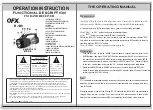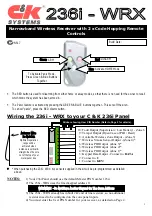
8
Aviat Networks
Check that all other link health indicators are normal before investigating an
interference problem. Then check for any new link installations in the same
geographical area, on the same frequency band, which coincide with the onset of BER
alarms. Confirming interference may require use of a spectrum analyzer.
10
-6
BER threshold exceeded
Received data has exceeded a threshold of 1 error bit in a data stream of 10
6
bits
(0.0001% error rate). This is a warning alarm.
Probable Cause
The most common cause is path degradation through rain fade, diffraction, or
multipath. Other causes are equipment malfunction or interference.
Recommended Actions
• Check for other alarms, particularly those that indicate a component failure, or a
complete path failure:
• Component failure or Rx path failure alarms must be checked before investigating
a BER Threshold alarm.
• If the only other alarms are Demodulator Not Locked, and its downstream path
failure and path warning alarms, a path failure is indicated, which may be caused
by a complete path fade or a remote Tx failure.
• If BER Threshold Exceeded
is the only active alarm
,
apart from other G.826 path
warning alarms
, check G.826 and RSL measurements at both ends using the
Portal Performance screen:
• If low RSL and G.826 alarms are present
at both ends of the link
, a path problem
is indicated, which is most likely caused by a degraded path due to rain, diffraction
or multipath fading. Prevailing weather conditions should provide clues to
support such conditions. If low RSLs remain (
permanent at
both ends
) a change
in path parameters is indicated, such as an antenna out of alignment, or an
obstacle in the signal path. If there have been abnormal weather conditions such
as exceptionally strong winds, suspect antenna alignment.
• If BER Threshold alarms are present
at just the local end and RSL is normal
, a
failure in the modulation process at the remote end, or interference from another
link should be suspected:
- - Check remote-end LINK/RAC Tx alarms. An equipment problem is not
normally fleeting, meaning the Event Browser screen should show a permanent
alarm with a definite starting point.
- - A newly installed interfering link should show a repetition of G.826 alarm
occurrences as it is installed and commissioned. Use the Portal History and
Event Browser screens to track the onset of BER alarms.
• If BER alarms coincide with
low RSL
and just one end
of the link is affected
, a
remote RAC or ODU equipment problem is indicated. Check remote Detected
Forward Power and Tx alarms.
Additional Information
Rain fade is the likely cause of fade for links 13 GHz and higher. Diffraction and
multipath/ducting for links 11 GHz and lower. If these alarms are persistent, there
could be a problem with the link design or original installation.
Summary of Contents for ECLIPSE EDGE
Page 1: ...ECLIPSE EDGE Version 5 USER MANUAL 260 668080 001...
Page 2: ......
Page 3: ...Eclipse Edge Microwave Radio System User Manual Software Version 5 0 March 2013...
Page 14: ...16 Aviat Networks INDEX...
Page 18: ......
Page 26: ...8 Aviat Networks Chapter 1 Health and Safety...
Page 272: ...36 Aviat Networks Chapter 3 Eclipse Edge Installation...
Page 273: ......
















































